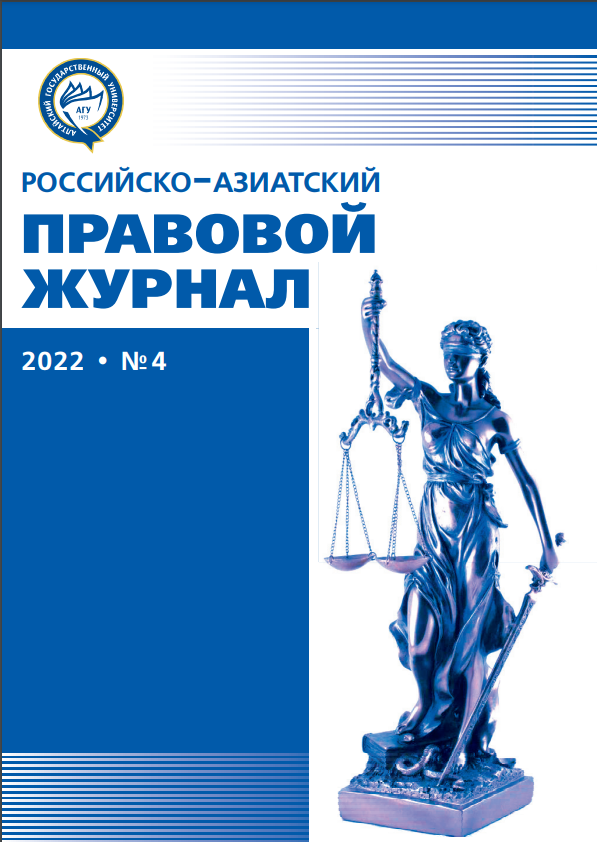ВОЗНИКНОВЕНИЕ И РАЗВИТИЕ ПОНЯТИЯ «СПЕЦИАЛЬНЫЕ ЗНАНИЯ» В ДОРЕВОЛЮЦИОННЫЙ ПЕРИОД
УДК 343.98 ББК 67.52
Abstract
The article is devoted to the study of the genesis of the development of the term of special knowledge incases of insult, subjects of the use of special knowledge in the pre-revolutionary period of the Russian state.The necessity of scientific development of approaches to understanding the essence of special knowledge inrelation to the Russian legal system, including criminal, civil and a set of norms in cases of administrativeviolations, is substantiated. The importance and necessity of a competent interpretation of such a legal termis emphasized.The article analyzes the works of scientists on this topic, gives estimates and generalizations to this stageof the development of the term “special knowledge”. Thus, the articles of a number of scientists on this topicare analyzed, after reviewing and quoting scientific research on this topic, analytical conclusions are givenon the influence of such ideas on the general construction and scientific justification of theoretical views on the definition of the term “special knowledge”, subjects of the use and application of special knowledge,as well as the sectoral nature of such knowledge, that is, the use of opportunities various humanities andnatural sciences to address issues arising in the course of legal proceedings.The article provides an overview of the sources of Russian law, which contain indications of thepossibility of applying special knowledge, the subjects of their application or the nature of the applied specialknowledge. The importance of studying the history of the development of the term of special knowledge forthe formation of a holistic picture of the understanding of this multidimensional legal concept is emphasized.At the end of the study, a conclusion is made about the scientific elaboration of the genesis of specialknowledge in the pre-revolutionary period, as well as its influence on the further stages of the developmentof this scientific problem.
Downloads
References
Светличный А.А. Зарождение и развитие института специальных знаний в дореволюционной России // Известия ТулГУ. Экономические и юридические науки. 2014. №3–2.
Шиканов В.И. Использование специальных познаний при расследовании убийств. Иркутск : Изд-во Иркут. ун-та, 1976. С. 13.
Нестеров А.В. О зарождении и развитии некоторых категорий экспертики // Эксперт-криминалист. 2012. №2. С. 20.
Энциклопедия судебной экспертизы. М. : Юристъ, 1999.
Криминалистическая экспертиза: возникновение, становление и тенденции развития / под ред. В.П. Лаврова. М. : ЮИ МВД РФ, 1994.
Исаева Л. Зарождение экспертизы в российском уголовном судопроизводстве // Законность. 2004. №3. С. 46.
Крылов И.Ф. Криминалистическая экспертиза в России и СССР в ее историческом развитии // Избранные труды по криминалистике. СПб. : Изд-во СПбГУ, 2006. С. 21.
Кутафин О.Е., Лебедев В.М., Семигин Г.Ю. Судебная власть в России. История. Документы. Начала формирования судебной власти : в 6 т. М., 2003. Т. 1. С. 15.
Омельченко С С. Оскорбление и клевета в уголовном праве России XI–XVII вв. // Актуальные проблемы российского права. 2008. №1. С. 240–246.
Полное собрание законов Российской империи. СПб., 1820. Т. 111. №1732.
Махов В.Н. Использование специальных знаний сведущих лиц при расследовании преступлений. М. : Изд -во РУДН, 2000. С. 12–22.
Комиссарова Я.В. Институт использования специальных знаний в России: исторический аспект // Эксперт -криминалист. 2008. №1. С. 3.
Свод законов Российской империи // Классика российского права. Б. д. URL: http://civil.consultant.ru/code/.
Ю. Глазер. Руководство по уголовному процессу. СПб. : Тип. «Общ. Польза», 1915. Т.I. Вып. 2. С. 18.
Russian-Asian Law Journal is a golden publisher, as we allow self-archiving, but most importantly we are fully transparent about your rights.
Authors may present and discuss their findings ahead of publication: at scientific conferences, on preprint servers, in public databases, and in blogs, wikis, tweets, and other informal communication channels.
Russian-Asian Law Journal allows authors to deposit manuscripts (currently under review or those for intended submission) in non-commercial, pre-print servers such as ArXiv.
Authors who publish with this journal agree to the following terms:
- Authors retain copyright and grant the journal right of first publication with the work simultaneously licensed under a Creative Commons Attribution License that allows others to share the work with an acknowledgement of the work's authorship and initial publication in this journal.
- Authors are able to enter into separate, additional contractual arrangements for the non-exclusive distribution of the journal's published version of the work (e.g., post it to an institutional repository or publish it in a book), with an acknowledgement of its initial publication in this journal.
- Authors are permitted and encouraged to post their work online (e.g., in institutional repositories or on their website) prior to and during the submission process, as it can lead to productive exchanges, as well as earlier and greater citation of published work (See The Effect of Open Access).








